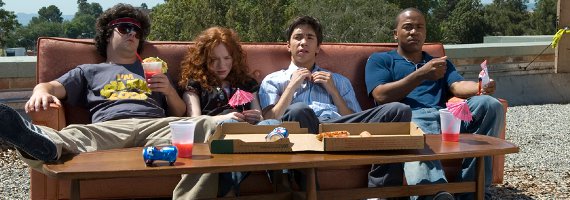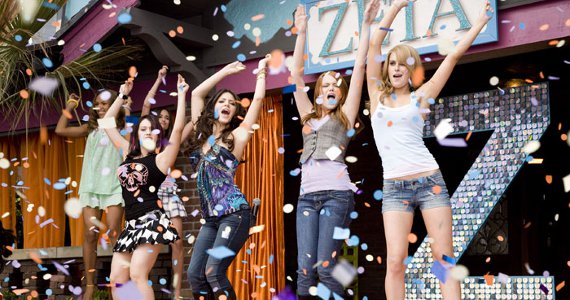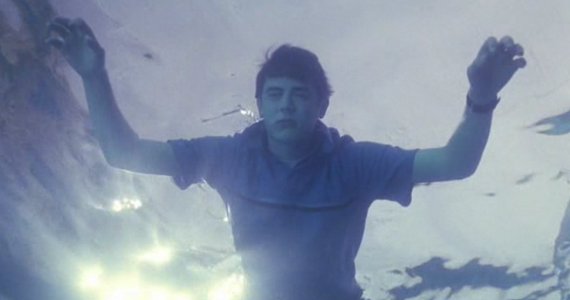
Trope Talk is my way of dishing out and breaking down the timeless and the tiresome of cinema’s most recognizable tropes, archetypes and formulas. In this edition, with only a short amount of time left in my own college education, I’ll be looking at the components of some college-set comedies.
College is and, simultaneously, is not like what we see in movies. Maybe, like anything else, it depends on the lived experiences of each individual viewer. I want to first acknowledge two of the most classic college movies, which I admittedly and unfortunately have not seen in full (otherwise they would have been perfect to examine here, of course): National Lampoon’s Animal House (1978) and Old School (2003). But, I came up with the following list of films to discuss instead, based on having seen them at least once, even if not recently: National Lampoon’s Van Wilder (2002), Orange County (2002), Accepted (2006), The House Bunny (2008), and the black sheep for non-conformity’s sake—Pitch Perfect (2012). I would include Pixar’s prequel, Monster’s University (2013), but that in itself is a parody, if only because it is animated. Without further ado, rather than going film by film, let’s go trope by trope.
First, there are always crazy, over-the-top parties; every great college film has to have at least one party scene, because that’s what everyone at college does all the time, right? I think partying is seen to varying levels of excess and grandeur in all these films, but most prevalently in Van Wilder, where the title character, played by Ryan Reynolds, never even wants to graduate. After seven years of throwing the wildest parties and otherwise slacking off, his father decides not to pay his tuition any longer, forcing him to become a professional party-thrower of sorts. Drinking, debauchery, dramatic flair and, finally, males trying to “score” with females usually ensue in some combination and to differing extents at these cinematic college parties, where the sexual meets spectacle in a way that makes us forget that college is even remotely intended for educational purposes.
This brings me to the token eccentric characters of college films; in the case of Pitch Perfect and Accepted, these types of characters are refreshingly plentiful and prominent. But first, there is Taj (Kal Penn) in Van Wilder, and Lance Brumder (Jack Black) in Orange County as the deadbeat, drugged out brother of overachiever, Shaun (Colin Hanks). Accepted, on the other hand, depicts a college that is, in many ways, democratically designed for educating the strange, the odd, and the unwanted. The film revolves around Bartleby (Justin Long) as his lie spirals into an actual institution he must help to maintain—South Harmon Institute of Technology, a fake school housing the many other high school graduates who were not accepted anywhere legitimate. Lewis Black plays the crazy pseudo-dean, while Bartleby’s friends do everything from cooking to wood carving to trying to blow things up with their minds.
Pitch Perfect, meanwhile, uniquely centers upon the apparently cutthroat world of competitive, college-level a cappella. Anna Kendrick stars as Beca, with a hilarious and, again, varied cast of characters, including Rebel Wilson as Fat Amy. Like in The House Bunny, it seems at first that these girls are too quirky and should conform to the Barden Bellas. But, instead of having the girls change individually to fit some stuffy, outdated ideal of feminine beauty and poise, the girls work together, using their different personalities and talents to change the entire reputation, style and attitude of the Bellas as an a cappella group itself. While high school movies often focus on cliques and peer pressure, college movies seem to present a slightly easier, or at least differently difficult, opportunity for people of all kinds to find their place.
This leads me to my final trope, even though there are surely many others that can be gleaned. In most of these films, there is a kind of pressure that characters face that seems oddly realistic compared to these other tropes. In the pre-college tale of Shaun Brumder in Orange County, the pressure comes from his intellect and ambition—he wants to attend an Ivy League school, but his transcript was fatefully mixed up with an underachiever’s by the school guidance counselor. He spends the duration of the film trying to rectify the mistake and get into Stanford in any way he can, and the resulting misadventures seek to teach him something about himself as well. In Pitch Perfect, Beca faces pressure from her father and from her love interest Jesse (Skylar Astin). She is stubborn about college at first and she isolates herself from others. She also faces pressure from Anna Camp’s character, Aubrey, who is equally stubborn about changing anything about the Bellas at first.
In Accepted, pressure is seen first through Jonah Hill’s character, Sherman, particularly when he is forced to wear a hot dog suit and exclaim “ask me about my wiener;” similar to peer pressure, this is just one of the many moments where hazing is played for laughs. Sherman is desperate to impress his fraternity, even if only for legacy’s sake; college kids seem even more expected to make everyone else besides themselves happy. Then, there is the main struggle Bartleby experiences once outside forces threaten to take over the makeshift campus. This movie, like The House Bunny, concludes with a humorously triumphant sort of underdog trial. In reality, traditional academics would play into the pressures of time management and prioritizing, but it is nice to know there is some acknowledgement in these films of at least the social and circumstantial pressures that can exist while these students struggle to find themselves—even if these pressures and struggles are still embellished quite a bit.
The interesting thing about college movies though is that they’re all similar in these specific ways but can vary in many others, as I’ve also tried to highlight here. High school films often don’t allow for as much variation in tropes, character types, and narrative patterns. Like any other film genre, these movies give us a funhouse mirror reflection of real life. And in the specific case of the college-set comedy, that reflection is indeed very fun to behold.



